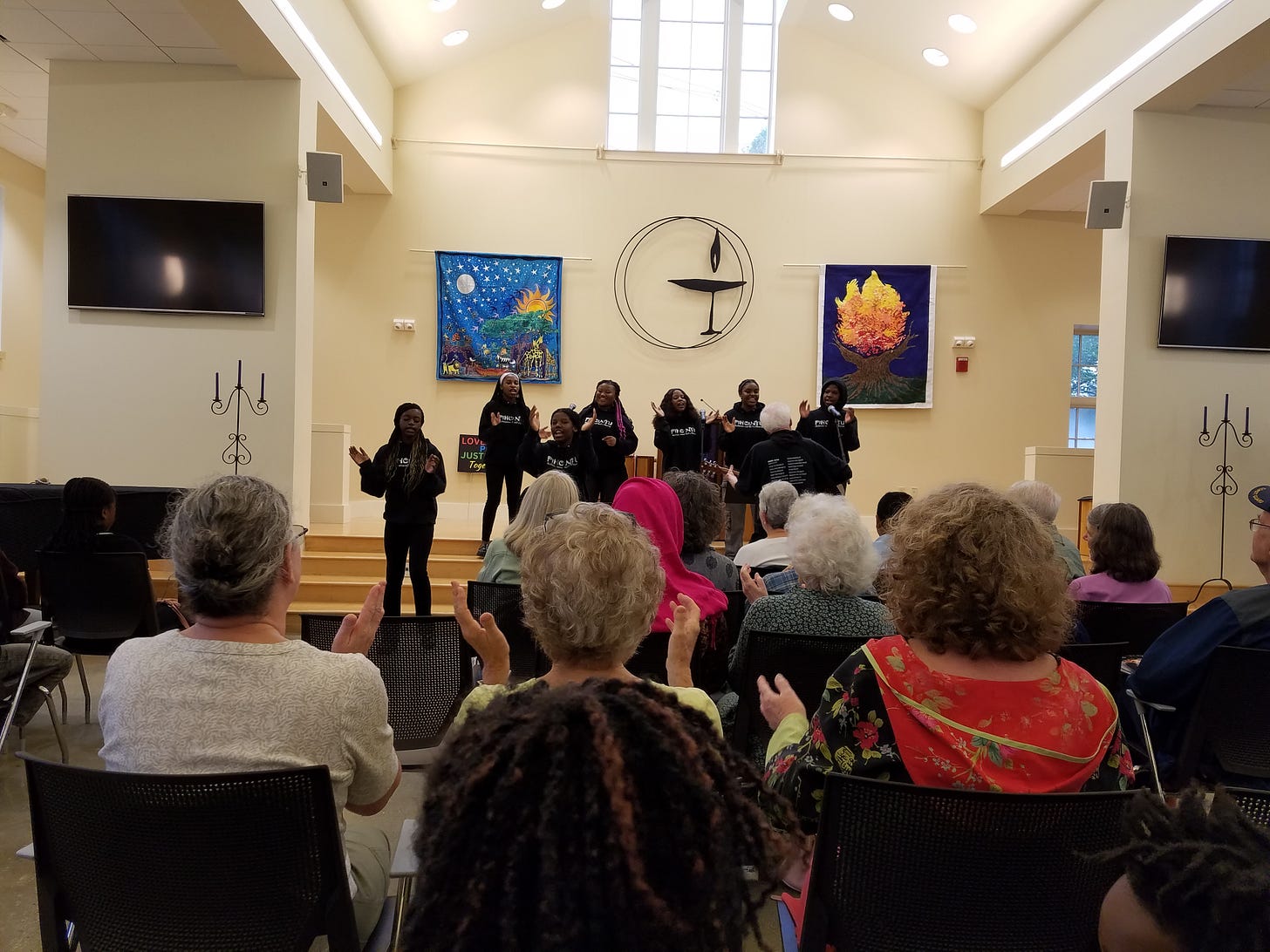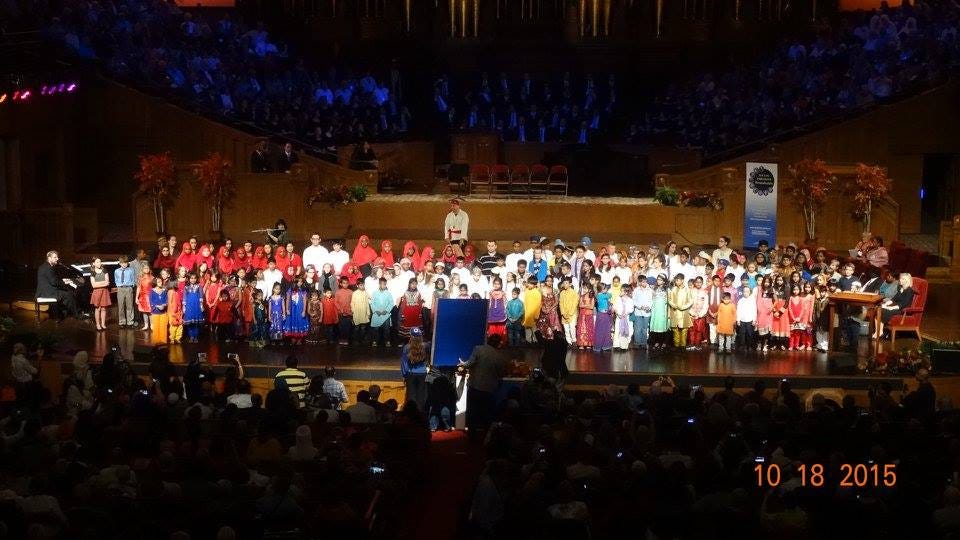“When the whole world is silent, even one voice becomes powerful.”
— Malala Yousafzai
“Pihcintu,” a Passamaquoddy word that means “when she sings, her voices carries far.”
We carry voices.
Voices carry.
When we were little, maybe some of us were told we could not sing. Maybe some of us got the message that we couldn’t speak in public. Maybe some of us were told the world would not hear what we had to say. Maybe some of us believed the grownups who said, “Children should be seen but not heard.” Maybe some of us were silenced in all kinds of ways.
Whoever told us we could not or we should not — they were wrong. We carry voices, and our voices carry. Even if our actual voices do not work for some reason, our faces, our gestures, our very act of breathing in and out make our presence part of the voices that carry. We get to choose whether or not we will use our voices to carry messages of good or ill, truth or falsehood, kindness or cruelty, healing or injury.
Last weekend I attended a concert by Pihcintu, a widely acclaimed local girls’ chorus. Pihcintu is a Passamaquoddy word that means “when she sings, her voice carries far.” Founded in 2006, Pihcintu gathers girls who are asylum seekers, refugees, and immigrants from all over the world. Their personal stories often involve trauma I can barely even imagine — war, hunger, refugee camps, violence, terror, and more. Settling here in America, even though it offers respite from previous horrors, has its own challenges — new language, strange food, different culture, lack of adequate public transportation, housing shortages, parents who have to wait months to get a green card before they can get a job, racism, anti-immigrant hysteria, legal challenges, hoops to jump through on every level, and more.
The Pihcintu girls sing together, and through their singing, they begin to heal. They find connections and family here in America. They begin to make this country their own. When they sing, they create a kind of unity that I find inspiring, because, despite language, cultural, and religious differences, they build a community together. Their blended voices carry, ringing out the song of the world as it could and should be.
Here’s what the Pihcintu website tells us:
Since its inception in 2006 the chorus has performed for over 300,000 live and hundreds of millions via broadcast and internet media including the Today Show, National Public Radio, Voice of America, Al Jazeera, Univision, UN TV and You Tube. They have appeared at The John F. Kennedy Center for the Performing Arts, Washington DC, The National Cathedral, Washington, DC and the United Nations, New York, New York to name but a few of the venues. Over the course of time over 300 girls representing 40 countries have passed through the chorus with 100% high school graduation and 85% post-secondary education. Pihcintu – Pihcintu Multi National Girls Choir

Despite all that is wrong with the world, children still sing, their voices carrying in a particular way. Small children have the endearing voices of innocence and trust. Older children have the more mature voices of people who are beginning to see the world with all its warts but who still sing with hope for the future. All children, for me, represent both hope and the inspiration to help build the world they will inherit. And that latter element — building the world — makes me feel both the possibility of what could be and the sadness and frustration of the blemishes and bruises that still need to be healed.
Nine years ago, I attended the Parliament of World Religions when it met in Salt Lake City, Utah. Representatives of different religions from all over the world gathered to increase understanding and to find common ground. That alone was inspiring for me. Of course, there were some religions who chose not to participate — religions who are so convinced of their own rightness and, in particular, everyone else’s wrongness that they would never join such a gathering. Nonetheless, the wide swath of faiths and beliefs represented at the Parliament and the genuine curiosity, openness, and friendliness I witnessed there filled my heart to overflowing.
For me, the most hopeful event happened at the end of the week. Attendees gathered at the Mormon Tabernacle, which was down the street from the convention center, for a concert put on by many different convention participants. Everyone, from the Mormon Tabernacle Choir singing hymns, to native tribes drumming, to Tibetan throat singers chanting, to whirling dervishes dancing found a place in the program.
Best of all was the children’s choir. All week long, while the grownups were attending lectures, films, and panels, the children had enjoyed their own program. They formed a choir for the concert. And they sang. Together. In their native costumes and religious garb. Little children and older children. From cultures and religions all over the world, they sang with one voice “Peace, Salaam, Shalom,” by Pat Humphries, among other songs. They sang the world as it could and should be. I wept as I listened and watched.

For me, the voices of children carry in a particular way. Children’s voices heighten and magnify not only the work we need to do but also the hope that the work can be accomplished.
This week, as the world witnesses the fighting in the Middle East escalating in increasingly alarming ways, I cannot help but draw inspiration from children who reach out across differences. I am reminded of the Seeds of Peace Camp here in Maine. Since its inception in 1993, the Seeds of Peace camp has gathered children from regions of conflict all over the world with the goal of teaching listening skills and building bridges. And, yes, even this past summer — a summer of horrific conflict in the Middle East — the camp gathered children from Israel, Palestine, Egypt, Jordan, India, Pakistan, the United Kingdom, and the United States to learn and grow together, to become seeds of peace, to become voices for the world of our dreams. Just imagine if the world would hush the noise long enough so that their voices, the voices of those young seeds of peace, could carry! - Seeds of Peace
I don’t know how it is for you, but I need sources of inspiration so that I can find and use my own voice, so that I can do the work I need to do. For me, one such source of inspiration is the gathered voices of children, children who sing, who dream, who speak a better world into being. They help me to use the voice I carry, with hopes that my voice will carry far.
Pihcintu — “when she sings, her voice carries far.” And that is one good thing.
Love,
Sylvia




Sure needed this “good thing “ today. Thanks.
There’s a unique communication within music and poetry. Sound can soothe; perhaps especially with harmony.
Thanks, Sylvie.
Children singing always touches me straight to the heart and makes me cry. There is so much sweetness in that sound. Thanks for reminding me to look for one more good thing.